Village Ghetto Land
The Milk and Honey Paradox

Disclaimer: The views expressed are my own and I do not intend them to be taken as fact. I do not own any of the images and video used.
The Docks
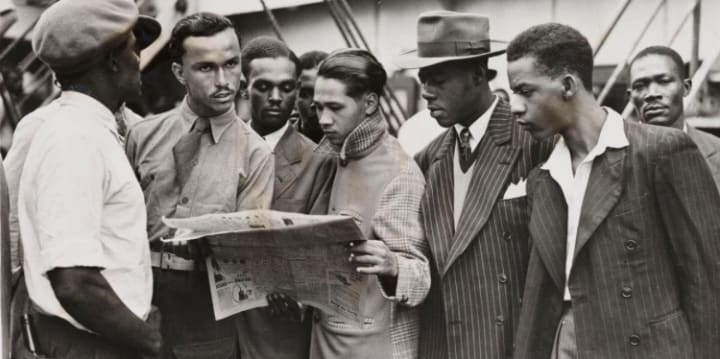
The late 1940s, on the docks of Tilbury. Men, women and children file out the broadside of a large white ship. A sea of sharp suits, well worn yet heavy dresses, brimmed hats and brimming smiles flow onto the Essex seaside docks. Flowing into the capillaries of a wounded city in repair. A blood transfusion, its contents saturated with eager workers, young families and hopeful servicemen in search of their next adventure.
The day the HMT Windrush docked in Tilbury was indeed the end of that literal journey. However, the voyage into a deeper understanding of the reality its passengers would face was only the beginning of an even longer journey. A journey still in progress today.
Stevie Wonder, Biblical Quotes, and the Windrush Generation
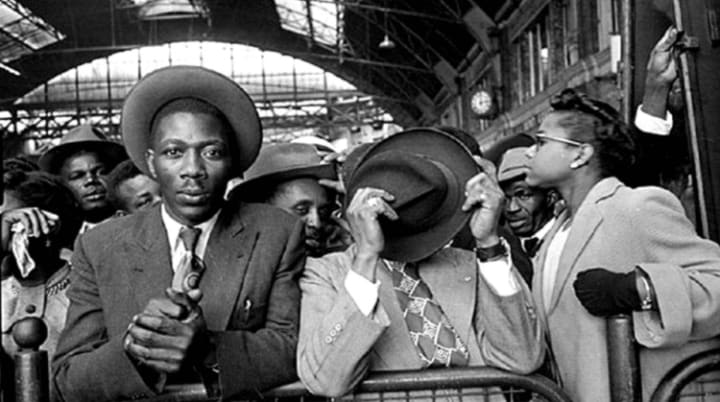
Although the things mentioned above seem unrelated, I will make a case for why they are deeply connected in an emotional and maybe even philosophical way.
In order to do that, over the course of this blog post I will link themes of different backgrounds and context to make a wider point on my opinion on recent events. If I seem to stray to an unrelated topic I ask you to stay with me, The road I take may bend but the destination will remain the same.
A few nights ago as I sat in my living room scrolling through my social feeds, I came across a video of Labour MP David Lammy shouting down Home Office Secretary MP Amber Rudd in the House of Commons over the recent "Windrush generation" scandal that has come to light recently. A saddening revelation that has seen lifelong Jamaican residents in the UK’s British citizenship questioned under new immigration documentation laws that were introduced in 2010.
As I watched the video I felt a level of pride at the points that David Lammy hit with expert precision and delivery, but the overwhelming emotion I felt was disgust. Disgust at the fact that he had to shine a light on such a deflating and disappointing situation that quite frankly seems like an old song everyone remembers they hate but is somehow still on the radio. A constant reminder of what should have been left in CD bargain Bin of history, towards the back of an HMV next to a Woolworths somewhere on the outskirts of Lincolnshire.
While I’m on the topic of music, that same evening I had re-discovered some Stevie Wonder music, appreaciating his genius and social impact.
One Song struck me in particular. In 1976, on arguably his best album, Stevie Wonder released "Village Ghetto Land." In the song, over a regal and classical orchestral string arrangement, the lyrics cut through like a knife, exposing the meat of the songs' subject, contrast and willful ignorance.
Over a light and optimistic orchestral string melody, the words describe the hopeless despair and horrific experiences of those in abject poverty. Beggars fetching their meals from rubbish bins, children’s hands covered in sores, infant mortality and families forced to eat dog food to avoid starvation are some of the examples explored in the song.
On this night, as I sat in my living room, the subject of the song spoke to me in a way it never really did before. Of course, on first hearing it I grasped the meaning and its contradictory tone, but never in this context. Not in a context that refers to a phrase that caught my attention a while ago.
Biblical Quotes: The Land Of Milk and Honey
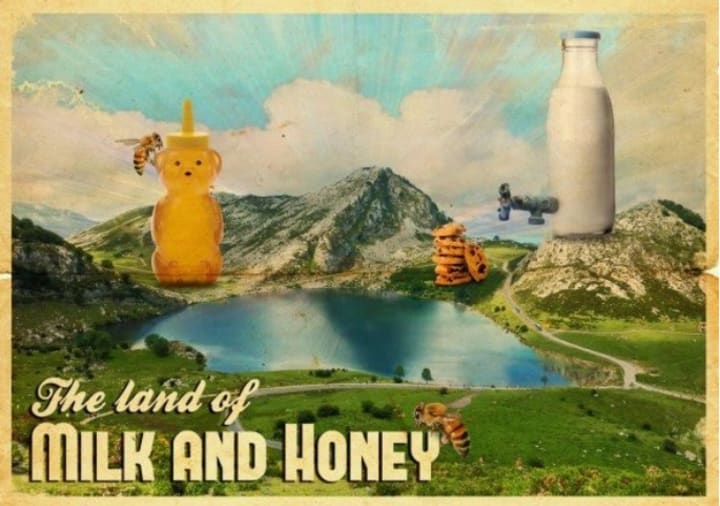
"The land of milk and honey" is a phrase with biblical origins that refers to a land of opportunity. A promise land. To me the use of those two ingredients suggests abundance and wealth, I quite like the phrase.
However, in respects to the subject I am exploring it carries a different meaning. In my mind, it refers to the promise of stability, abundance and most importantly, British Citizenship. A promise made to that Windrush generation that bundled onto the crowded ship headed for the British Isles 70 years ago.
The phrase struck me because it made me picture a sarcastic delivery of the words. Something nobody believes anymore. It made me picture a few huddled suits, long coats and dresses scanning their new surroundings with bags clutched and eyes wide. One of them would turn to the other: ‘‘Here we are, the land of milk and honey’’ they would remark with eyes rolled.
To that generation now, the milk is lumpy and the honey doesn’t smell the same. That promise has expired.
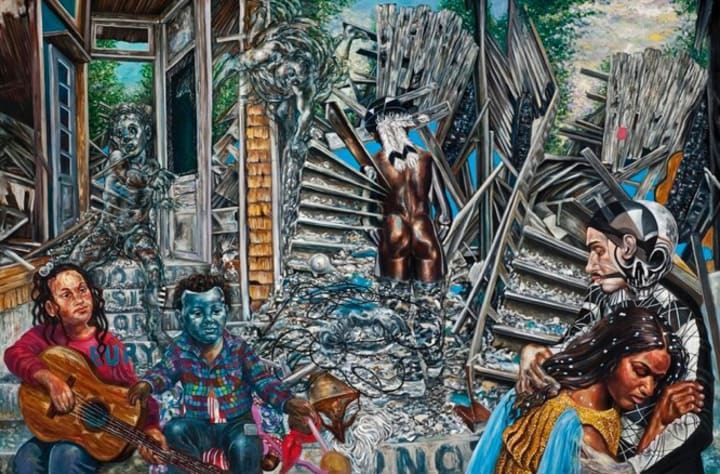
‘Village Ghetto Land’ by Stefanie Jackson
As the contradiction in the relationship between the music and lyrics of "Village Ghetto Land" became clearer, so did how it mirrored the contradiction in the promised land of milk and honey. Not only due to recent events, but for the historical context. The infamous phrase in the context of all the events and information became paradoxical. An idea that at first glance seems to make sense, but on closer inspection is a contradiction.
The song in my mind became a metaphor. The contradiction in the song illustrated the contradiction between the Windrush generations expectation and their experience in this country both historically and currently. The orchestral strings represent the paradoxical promise, and the lyrics represent the reality. But now it seems the lyrics are louder than the music.
Earlier I had said "the milk is lumpy and the honey doesn’t smell the same." However, I think it’s deeper than that. I think we might have been happier if the milk was lumpy and the honey didn't smell the same, because that implies it existed at some point.
All Things Considered
In the end, it all seems like a message. A statement made on what certain people in powerful positions rate the Windrush Generation's worth to be, and it doesn’t seem they reckon much at all. Even after the years of military services before and after the migration, years of working in this countries public sectors to help the country continue to run and grow, after having lived in this country for decades as British citizens, people have lost jobs, access to healthcare, and have been left stranded in the country they no longer have family in, a country they no longer call home. After all of that, it seems rather difficult to accept just an apology and a promise to do better. In the end, it doesn’t seem very sincere. Apologies after deliberate acts of disrespect never do.
Earlier I had said "the milk is lumpy and the honey doesn’t smell the same." However, I think it’s deeper than that. I think we might have been happier if the milk was lumpy and the honey didn't smell the same. Why? Because that implies it existed in the first place.
It seems the promise never really did.


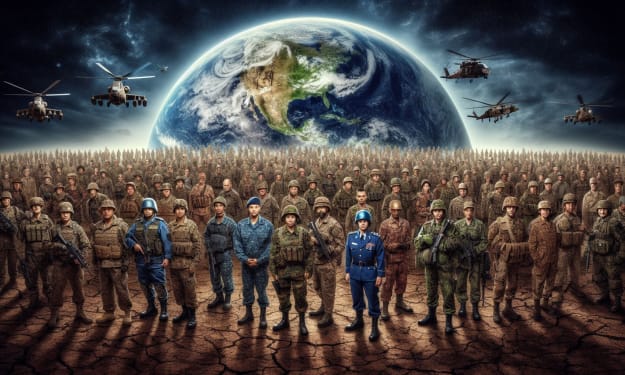



Comments
There are no comments for this story
Be the first to respond and start the conversation.